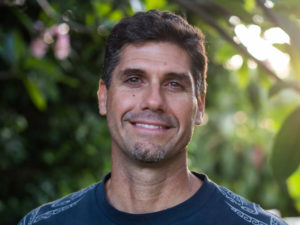Free Talk by Mark Deakos on ”Creating a Future for Manta Rays and Coral Reefs By Creating Living Buildings and Communities that Restore and Support Thriving Ecosystems”
Mark Deakos first began studying Maui’s manta rays for his Ph.D. By 2010 he had described the largest known population of manta rays in the United States with over 400 unique individuals. But over the past decade, much has changed. At one time aggregations as large as 30 manta rays could be seen but today, sightings of even a single adult are rare.
To learn more about the status of Maui’s manta ray population – and solutions to restore the health of our nearshore marine environment, including water quality, our coral reefs and our precious manta ray populations, join us for a talk by Mark Deakos at Maui Nui Marine Resource Council’s “Know Your Ocean Speaker Series” event on Wednesday, March 4 at The Sphere at Maui Ocean Center.
This event is free and open to all, but seating is limited. Advance reservations are recommended. Reserve at https://bit.ly/Deakos
In addition to sharing some amazing video footage of Maui’s manta rays, Deakos will present a framework of regenerative design that is sweeping the country; building and community designs that restore habitat and culture, control stormwater, recharge aquifers and streams, and improve the health and well-being of the people, plants and animals and our coral reefs.
“Imagine nurturing places that promote healthy lifestyles for people and have a positive impact on our coral reefs and marine wildlife,” says Deakos. “Come learn about Living Buildings and Living Communities that generate their own energy, capture and treat all the water they need, eliminate toxins and waste, and support the restoration of our nearshore ocean environment.”
The talk will include details on the Living Building Challenge and Living Community Challenge, performance standards born out of the International Living Future Institute (ILFI) which offer global strategies for lasting sustainability. By partnering with local communities, the International Living Future Institute works to inspire and incentivize green building and infrastructure solutions, on scales ranging from single room renovations to neighborhoods or whole cities.
“This type of sustainable development is fully possible on Maui,” says Deakos.
The “Know Your Ocean Speaker Series” is presented by Maui Nui Marine Resource Council to introduce the public to marine research and conservation efforts to protect Maui’s ocean resources. This series offers a free presentation every month, usually on the first Wednesday of the month. Maui Ocean Center generously donates the use of The Sphere for these presentations. The series is supported by the County of Maui Mayor’s Office of Economic Development.
Reserve your seat at https://bit.ly/Deakos

About Mark Deakos:
Mark Deakos came to Hawaii in 1996 to complete his master’s at UH Manoa, studying humpback whales and his PhD studying manta rays. He later founded the Hawaii Association for Marine Education and Research in 2004, a 501(c)(3) non-profit dedicated to protecting Hawaii’s marine resources. After two decades of marine science and scientifically describing the degradation of our natural resources caused by the increasing threats from unsustainable growth, he switched his focus on solutions. In his new role as Chief Sustainability Officer for 3-P Consulting, his ambition is to connect business owners, developers, planners and decision makers with sustainable, regenerative solutions that not only eliminate the threats but allow us to restore the damage we have caused.
About Maui Nui Marine Resource Council:
Maui Nui Marine Resource Council is a community-based nonprofit organization celebrating 11 years of working for healthy coral reefs, clean ocean water and abundant native fish throughout Maui County. Our work includes co-managing the Hui O Ka Wai Ola Ocean Water Quality Monitoring Program at 41 sites in South and West Maui, efforts to reduce pollution in Ma‘alaea Bay (through erosion-control efforts in the Pohakea watershed and using oysters to filter sediment and pollutants from ocean water), coral reef research, visitor education programs and more. Learn more at www.mauireefs.org.
About Maui Ocean Center:
Since 1998, Maui Ocean Center has fostered understanding, wonder and respect for Hawaiʻi’s marine life, drawing thousands of visitors from across the globe. The three-acre marine park, located in Wailuku, Maui, faithfully replicates the natural ocean ecosystem featuring only animals who are native to Hawai’i. The center features the largest collection of live Pacific corals in the world, over 60 exhibits, 20 daily presentations by marine naturalists, outdoor tide pools and a 750,000-gallon Open Ocean exhibit with a 240-degree view acrylic tunnel. Maui Ocean Center operates in compliance with a County of Maui ordinance prohibiting the exhibit of cetaceans (whales and dolphins) and offers exploration of these creatures through interpretive displays, including its cutting-edge “Humpbacks of Hawai‘i” Exhibit & Sphere. Under the guidance of Kahu Dane Maxwell, the aquarium integrates Hawaiian culture in presentations, exhibits, special events, and also in the marine park’s standards of operations and service. For more information, please visit https://mauioceancenter.com.



No Comments
Sorry, the comment form is closed at this time.